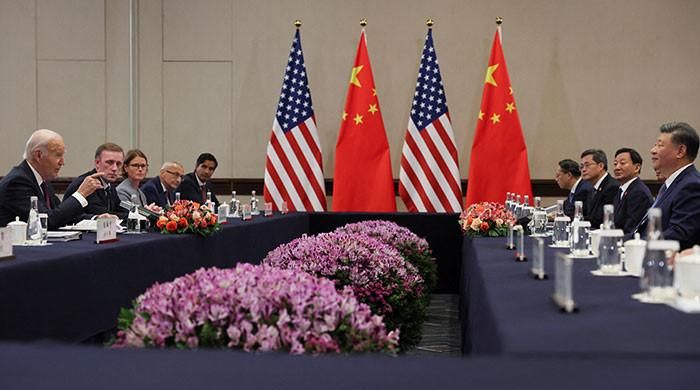- Xi highlights China's commitment to stable ties between China and the United States.
- Expresses willingness to manage differences with new US administrator
- Washington remains uneasy about China's support for Russia.
Chinese President Xi Jinping has pledged to cooperate with the incoming administration of President-elect Donald Trump.
The Chinese president said this during talks with outgoing US President Joe Biden while addressing important issues such as cybercrime, trade relations, Taiwan and Russia.
Biden met Xi at a hotel where the Chinese leader was staying, on the sidelines of the Asia-Pacific Economic Cooperation forum in Lima, Peru, for their first talks in seven months.
“China's goal of a stable, healthy and sustainable China-U.S. relationship remains unchanged” after the election, Xi said, acknowledging the “ups and downs” between the countries.
“China is willing to work with the new US administration to maintain communication, expand cooperation and manage differences.”
Biden told Xi that the two leaders have not always agreed but that their discussions have been “frank” and “sincere.”
The talks come two months before Trump takes office. He has promised to adopt blanket 60% tariffs on US imports of Chinese goods as part of an “America First” package of trade measures. Beijing opposes these measures. The Republican president-elect also plans to hire several tough voices on China in senior positions, including U.S. Sen. Marco Rubio as secretary of state and Rep. Mike Waltz as national security adviser.
Biden has sought to reduce tensions with China, but Washington is outraged by a recent China-linked hack of U.S. government and presidential campaign officials' phone communications and is concerned about Beijing's growing pressure on Taiwan and the Chinese support for Russia.
Taiwan President Lai Ching-te plans to stop in the US state of Hawaii and perhaps Guam in a sensitive visit that is sure to anger Beijing in the coming weeks, Reuters reported on Friday. Meanwhile, Taiwan's former Economy Minister Lin Hsin-i met Biden at Friday's summit and invited him to visit Taiwan in the near future.
China considers democratically governed Taiwan its own territory. The United States is Taiwan's most important international sponsor and arms supplier, despite the lack of formal diplomatic recognition.
Biden also wants China's help with North Korea, whose deepening ties with Russia and deployment of troops in the war with Ukraine have worried Washington.
China's economic blow
At the same time, Beijing's economy is taking a hit from Biden's trade measures, including a plan to restrict U.S. investment in artificial intelligence, quantum computing and Chinese semiconductors and restrictions on the export of high-quality computer chips. range. All of those issues are expected to figure in the talks, U.S. officials said.
China routinely denies U.S. hacking accusations, considers Taiwan an internal matter and has protested U.S. statements on China-Russia trade. A spokesman for the Chinese embassy in Washington declined to comment.
“When the two countries treat each other as partners and friends, seek common ground while putting aside differences, and help each other succeed, our relationship will make considerable progress,” Xi said during his meeting with Biden, according to a translation. simultaneous.
“But if we consider ourselves rivals or adversaries, pursue fierce competition, and try to hurt each other, we will disrupt the relationship or even delay it.”
On Wednesday, Biden's national security adviser, Jake Sullivan, described the transition as “a moment when competitors and adversaries can see potential opportunities.” Biden is emphasizing with Xi the “need to maintain stability, clarity and predictability through this US-China transition.”
Shen Dingli, a Shanghai-based international relations scholar, said China wants the meeting to ease tensions during the transition period. “China definitely does not want relations with the United States to be affected before Trump formally takes office,” Shen said.
Pacific Rim leaders meeting at the APEC summit are assessing the implications of Trump's return to power as US president on January 20. The South American summit offers new signs of the challenges to US power in its own backyard, where China is in the lead. a charm offensive.
Xi, who arrived in Lima on Thursday, plans a week-long diplomatic campaign in Latin America that includes a renewed free trade agreement with Peru, the inauguration of the huge Chancay deepwater port there and welcoming the Brazilian capital to the next week for a state. visit. China also announced plans to host the APEC summit in 2026.
China is seeking metal minerals, soybeans and other raw materials from Latin America, but U.S. officials are concerned they may also be seeking new military and intelligence outposts adjacent to the United States. Chinese state-backed media has called those accusations defamation.
A U.S. official said Washington's commitment to the region was strong and that Chinese investment in overseas infrastructure has slowed in recent years due to domestic challenges and problems with projects.
But Ryan Berg, director of the Americas Program at the Center for Strategic and International Studies, a Washington think tank, said Xi would be well received in the region.
“Biden's trip will clearly be overshadowed by all the things Xi Jinping will do when he visits APEC,” he said.
“When Xi meets with Biden, part of his audience is not; it's not just the White House or the US government. It's about American CEOs and continuing US investment or trying to renew US investment in China and get rid of the perception that there is a hostile business environment in China.”












